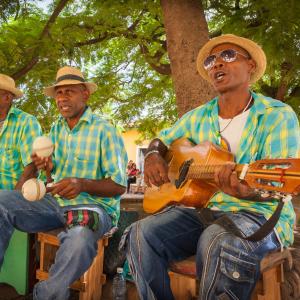Alex Nava, a professor of religious studies at the University of Arizona, is author of Wonder and Exile in the New World and the forthcoming In Search of Soul: Religion, Literature, and Hip Hop (Univeristy of California Press).
Posts By This Author
Raw, Exuberant Grace
Could the duende of Afro-Latin art and music set our theology free?

Maurizio De Mattei / Shutterstock
NIETZCHE GOT SOMETHING RIGHT about the soul: namely, that music is essential to its survival. In reacting to philosophical tendencies to marginalize or ignore the place of music, dance, poetry, and painting, Nietzsche would insist on the central importance of the arts in any philosophical investigation.
In my own discipline of theology, a similar concern is justified: When theology has taken its cue from modern philosophy, it, too, has slighted the role of music in considering the question of God. The result is a portrait of soul in monotone pitches, without color, without polyphony. Instead of a guiding rhythm in one’s reflections, music is often relegated to a footnote or to an echo that reaches one’s ear in barely perceptible, muffled sounds.
The most glaring exception to this general rule is the portrait of soul in black and Latin traditions. As James Baldwin famously noted, it is almost solely through music that black people have been able to tell their story. The same can be said about Latin cultures: Music has been a crucial medium for communicating with the modern world, with one’s ancestors, and with God. It has been a defining feature of black and Latin-American identities—a key ingredient in the stew and spice of these cultures.
Given the storytelling capacity of music in these cases, I believe that any theology worthy of the Christian conviction of incarnation—where God is embodied in the vast rainbow of human cultures—might want to begin by calibrating its body and soul to the frequencies of music. With music booming in our ears, we might get an alternative history of religion and culture, told at a sonic level, in the beats of a drum, a bass line, chant, or grunt. We might learn about cultural styles and struggles left off the written record of modern European accounts of the West, that exist only as oral and folk traditions.